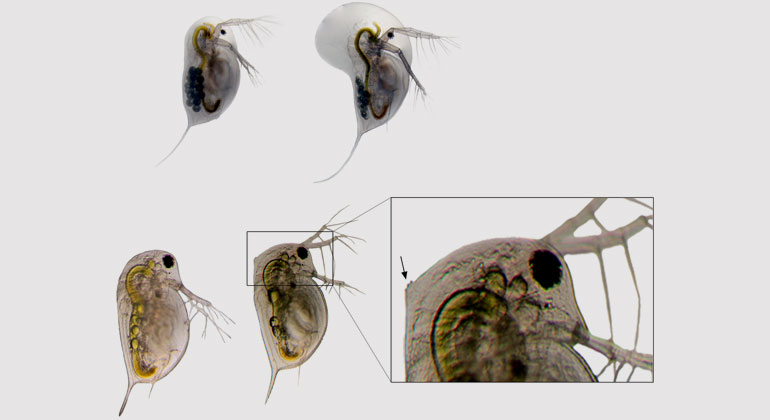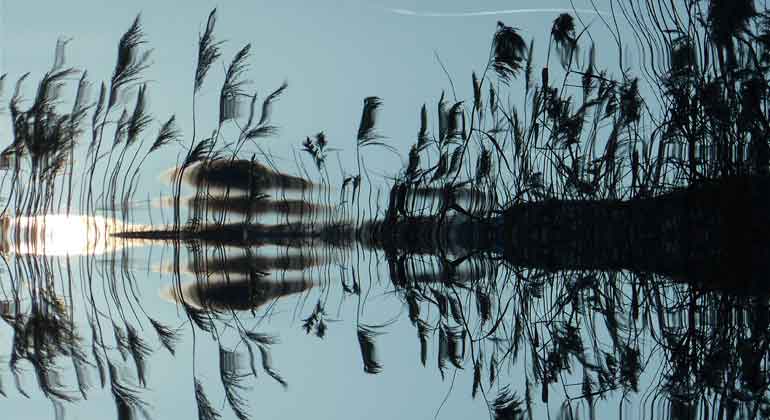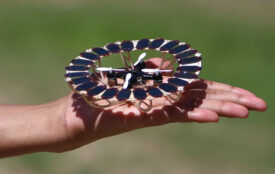Rising CO2 is causing trouble in freshwaters too, study suggests
As carbon dioxide (CO2) levels in the atmosphere rise, more CO2 gets absorbed into seawater. As a result, the world’s oceans have grown more acidic over time, causing a wide range of well-documented problems for marine animals and ecosystems. Now, researchers reporting in Current Biology on January 11 present some of the first evidence that similar things are happening in freshwaters too.
The study found that some freshwater ecosystems have become more acidic with rising pCO2 (partial pressure of CO2). They also show in lab studies that increases in freshwater pCO2 can have detrimental effects on at least one keystone species, a tiny freshwater crustacean, leaving them less able to sense and defend themselves against predators. The findings suggest that increasing CO2 levels may be having widespread effects on freshwater ecosystems.
“Ocean acidification is often called the ‘climate change’s equally evil twin,’ and many current investigations describe tremendous effects of rising CO2 levels on marine ecosystems,” says Linda Weiss at Ruhr-University Bochum in Germany. “However, freshwater ecosystems have been largely overlooked. Our data indicate another pCO2 problem: pCO2-dependent freshwater acidification.”
Studies on ocean acidification have shown that there are consequences for marine food webs, nutrient cycles, overall productivity, and biodiversity. Yet, the researchers say, surprisingly little has been known about the impact of rising atmospheric CO2 on freshwater systems. While scientists expected that there had been increased pCO2 in freshwater bodies, the data were lacking.
To investigate, Weiss and colleagues looked to four freshwater reservoirs in Germany. Their analysis of data over 35 years, from 1981 to 2015, confirmed a continuous pCO2 increase. As in the ocean, that increase has been associated with a decrease in pH (increasing acidity). In fact, they report a change in pH of about 0.3 within 35 years, suggesting that freshwaters may acidify at a faster rate than the oceans.
But what effect was that increasing pCO2 having on freshwater organisms? To begin to explore that question, the researchers focused their attention on small, freshwater crustaceans called Daphnia, also known as water fleas. Daphnia are a dominant species in many lakes, ponds, and reservoirs, and they are important as a primary food source for many larger animals.
When Daphnia sense that predators are around, they respond by producing helmets and spikes that make them harder to eat. Weiss’ team found in the lab that rising pCO2 levels get in the way of the water fleas’ ability to produce those protective features.
“High levels of CO2 reduce the Daphnia’s ability to detect their predator,” Weiss says. “This reduces the expression of morphological defenses, rendering them more vulnerable.” She adds that such effects on Daphnia may have broader effects on freshwater communities.
Weiss says they were fortunate to obtain such a long data series on four freshwater reservoirs. It will now be important to gather more data representing freshwater impoundments around the world.
“We now want to know the global degree of this phenomenon,” Weiss says. The question is: “Are all freshwater impoundments prone to this kind of acidification?”
###
- The researchers were funded by the National Academy of Sciences-Leopoldina and the German Federal Environmental Foundation (Deutsche Bundesstiftung Umwelt).
- Current Biology, Weiss et al.: “Rising pCO2 in Freshwater Ecosystems Has the Potential to Negatively Affect Predator-Induced Defenses in Daphnia” http://www.cell.com/current-biology/fulltext/S0960-9822(17)31655-X
- Linda Weiss, Leonie Pötter, Annika Steiger, Sebastian Kruppert, Uwe Frost, Ralph Tollrian: Rising pCO2 in freshwater ecosystems has the potential to negatively affect predator induced defenses in Daphnia, in: Current Biology, 2018, DOI: 10.1016/j.cub.2017.12.022
- Current Biology (@CurrentBiology), published by Cell Press, is a bimonthly journal that features papers across all areas of biology. Current Biology strives to foster communication across fields of biology, both by publishing important findings of general interest and through highly accessible front matter for non-specialists. Visit: http://www.cell.com/current-biology. To receive Cell Press media alerts, contact press@cell.com.









